Applying Deontology and Utilitarianism to Case Study
VerifiedAdded on 2023/04/21
|11
|2704
|340
AI Summary
This paper analyzes a case study on child refugees in Turkey working for UK shops and applies the theories of deontology and utilitarianism to understand its ethicality.
Contribute Materials
Your contribution can guide someone’s learning journey. Share your
documents today.
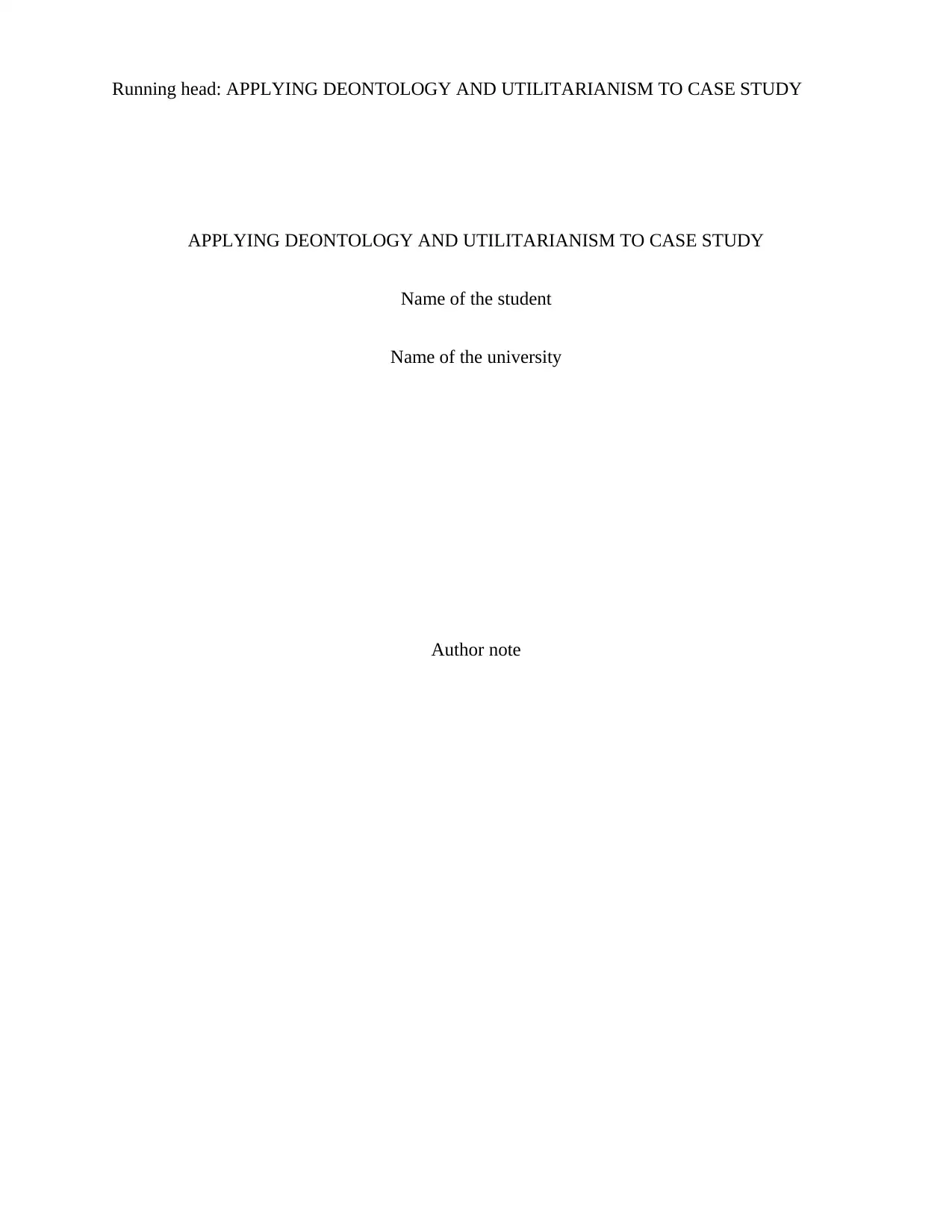
Running head: APPLYING DEONTOLOGY AND UTILITARIANISM TO CASE STUDY
APPLYING DEONTOLOGY AND UTILITARIANISM TO CASE STUDY
Name of the student
Name of the university
Author note
APPLYING DEONTOLOGY AND UTILITARIANISM TO CASE STUDY
Name of the student
Name of the university
Author note
Secure Best Marks with AI Grader
Need help grading? Try our AI Grader for instant feedback on your assignments.
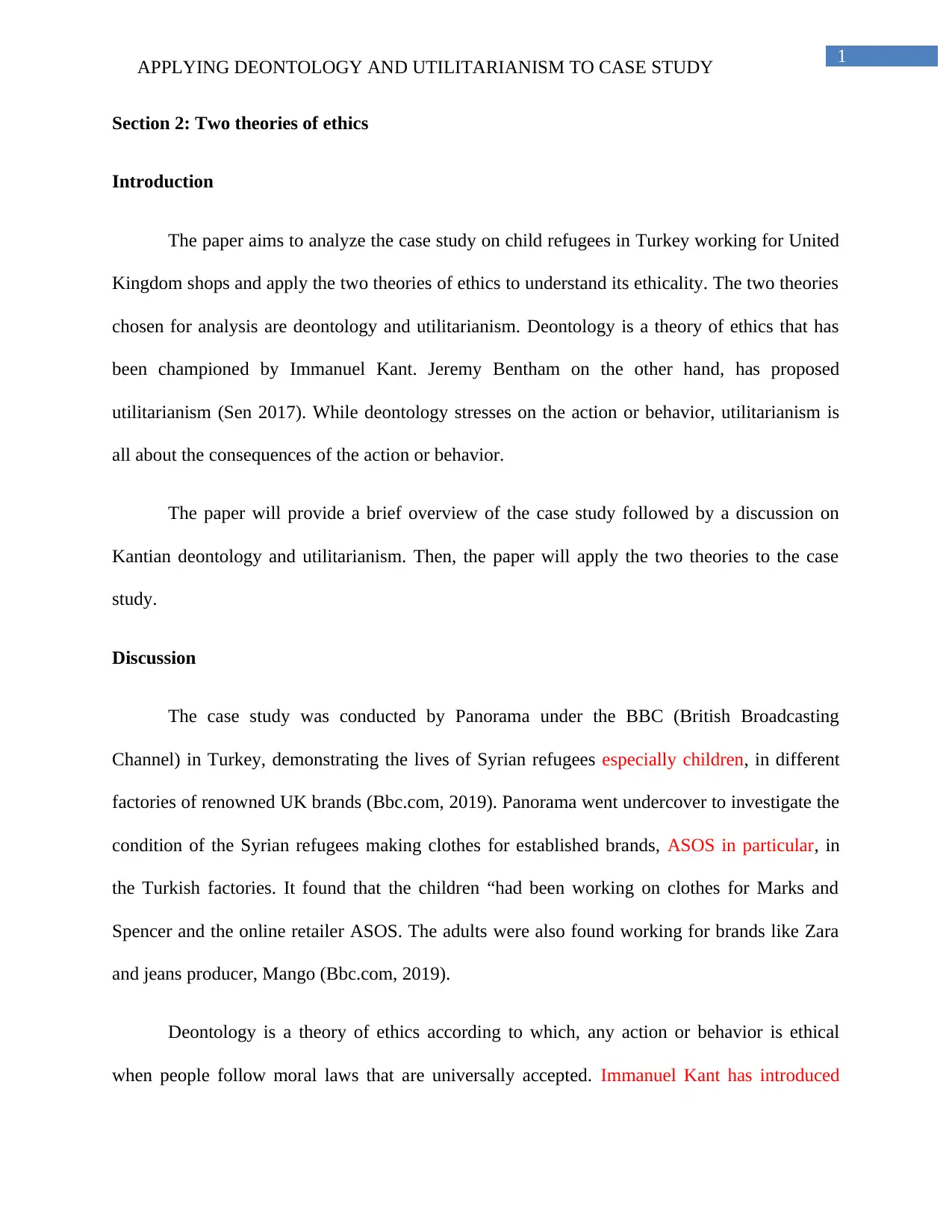
1
APPLYING DEONTOLOGY AND UTILITARIANISM TO CASE STUDY
Section 2: Two theories of ethics
Introduction
The paper aims to analyze the case study on child refugees in Turkey working for United
Kingdom shops and apply the two theories of ethics to understand its ethicality. The two theories
chosen for analysis are deontology and utilitarianism. Deontology is a theory of ethics that has
been championed by Immanuel Kant. Jeremy Bentham on the other hand, has proposed
utilitarianism (Sen 2017). While deontology stresses on the action or behavior, utilitarianism is
all about the consequences of the action or behavior.
The paper will provide a brief overview of the case study followed by a discussion on
Kantian deontology and utilitarianism. Then, the paper will apply the two theories to the case
study.
Discussion
The case study was conducted by Panorama under the BBC (British Broadcasting
Channel) in Turkey, demonstrating the lives of Syrian refugees especially children, in different
factories of renowned UK brands (Bbc.com, 2019). Panorama went undercover to investigate the
condition of the Syrian refugees making clothes for established brands, ASOS in particular, in
the Turkish factories. It found that the children “had been working on clothes for Marks and
Spencer and the online retailer ASOS. The adults were also found working for brands like Zara
and jeans producer, Mango (Bbc.com, 2019).
Deontology is a theory of ethics according to which, any action or behavior is ethical
when people follow moral laws that are universally accepted. Immanuel Kant has introduced
APPLYING DEONTOLOGY AND UTILITARIANISM TO CASE STUDY
Section 2: Two theories of ethics
Introduction
The paper aims to analyze the case study on child refugees in Turkey working for United
Kingdom shops and apply the two theories of ethics to understand its ethicality. The two theories
chosen for analysis are deontology and utilitarianism. Deontology is a theory of ethics that has
been championed by Immanuel Kant. Jeremy Bentham on the other hand, has proposed
utilitarianism (Sen 2017). While deontology stresses on the action or behavior, utilitarianism is
all about the consequences of the action or behavior.
The paper will provide a brief overview of the case study followed by a discussion on
Kantian deontology and utilitarianism. Then, the paper will apply the two theories to the case
study.
Discussion
The case study was conducted by Panorama under the BBC (British Broadcasting
Channel) in Turkey, demonstrating the lives of Syrian refugees especially children, in different
factories of renowned UK brands (Bbc.com, 2019). Panorama went undercover to investigate the
condition of the Syrian refugees making clothes for established brands, ASOS in particular, in
the Turkish factories. It found that the children “had been working on clothes for Marks and
Spencer and the online retailer ASOS. The adults were also found working for brands like Zara
and jeans producer, Mango (Bbc.com, 2019).
Deontology is a theory of ethics according to which, any action or behavior is ethical
when people follow moral laws that are universally accepted. Immanuel Kant has introduced
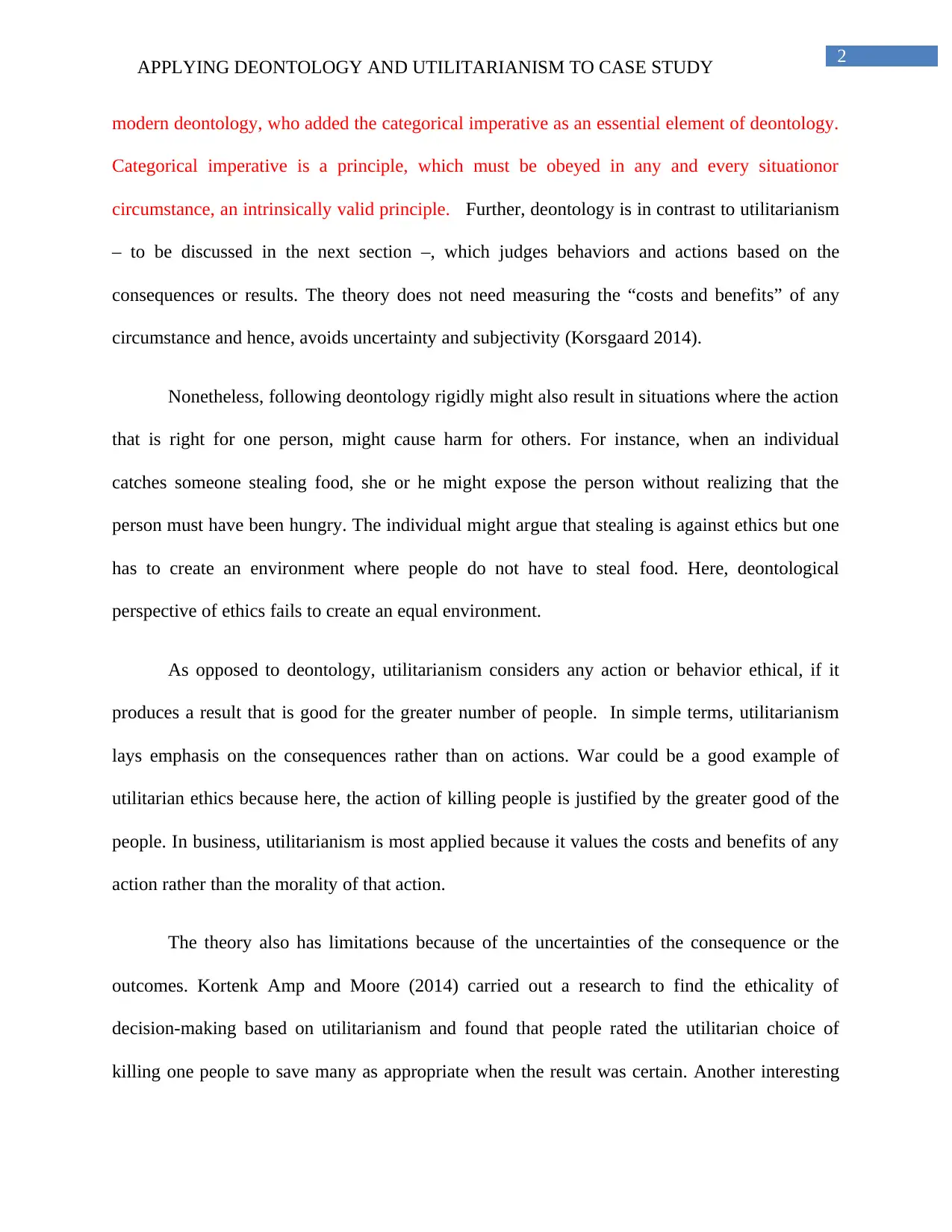
2
APPLYING DEONTOLOGY AND UTILITARIANISM TO CASE STUDY
modern deontology, who added the categorical imperative as an essential element of deontology.
Categorical imperative is a principle, which must be obeyed in any and every situationor
circumstance, an intrinsically valid principle. Further, deontology is in contrast to utilitarianism
– to be discussed in the next section –, which judges behaviors and actions based on the
consequences or results. The theory does not need measuring the “costs and benefits” of any
circumstance and hence, avoids uncertainty and subjectivity (Korsgaard 2014).
Nonetheless, following deontology rigidly might also result in situations where the action
that is right for one person, might cause harm for others. For instance, when an individual
catches someone stealing food, she or he might expose the person without realizing that the
person must have been hungry. The individual might argue that stealing is against ethics but one
has to create an environment where people do not have to steal food. Here, deontological
perspective of ethics fails to create an equal environment.
As opposed to deontology, utilitarianism considers any action or behavior ethical, if it
produces a result that is good for the greater number of people. In simple terms, utilitarianism
lays emphasis on the consequences rather than on actions. War could be a good example of
utilitarian ethics because here, the action of killing people is justified by the greater good of the
people. In business, utilitarianism is most applied because it values the costs and benefits of any
action rather than the morality of that action.
The theory also has limitations because of the uncertainties of the consequence or the
outcomes. Kortenk Amp and Moore (2014) carried out a research to find the ethicality of
decision-making based on utilitarianism and found that people rated the utilitarian choice of
killing one people to save many as appropriate when the result was certain. Another interesting
APPLYING DEONTOLOGY AND UTILITARIANISM TO CASE STUDY
modern deontology, who added the categorical imperative as an essential element of deontology.
Categorical imperative is a principle, which must be obeyed in any and every situationor
circumstance, an intrinsically valid principle. Further, deontology is in contrast to utilitarianism
– to be discussed in the next section –, which judges behaviors and actions based on the
consequences or results. The theory does not need measuring the “costs and benefits” of any
circumstance and hence, avoids uncertainty and subjectivity (Korsgaard 2014).
Nonetheless, following deontology rigidly might also result in situations where the action
that is right for one person, might cause harm for others. For instance, when an individual
catches someone stealing food, she or he might expose the person without realizing that the
person must have been hungry. The individual might argue that stealing is against ethics but one
has to create an environment where people do not have to steal food. Here, deontological
perspective of ethics fails to create an equal environment.
As opposed to deontology, utilitarianism considers any action or behavior ethical, if it
produces a result that is good for the greater number of people. In simple terms, utilitarianism
lays emphasis on the consequences rather than on actions. War could be a good example of
utilitarian ethics because here, the action of killing people is justified by the greater good of the
people. In business, utilitarianism is most applied because it values the costs and benefits of any
action rather than the morality of that action.
The theory also has limitations because of the uncertainties of the consequence or the
outcomes. Kortenk Amp and Moore (2014) carried out a research to find the ethicality of
decision-making based on utilitarianism and found that people rated the utilitarian choice of
killing one people to save many as appropriate when the result was certain. Another interesting
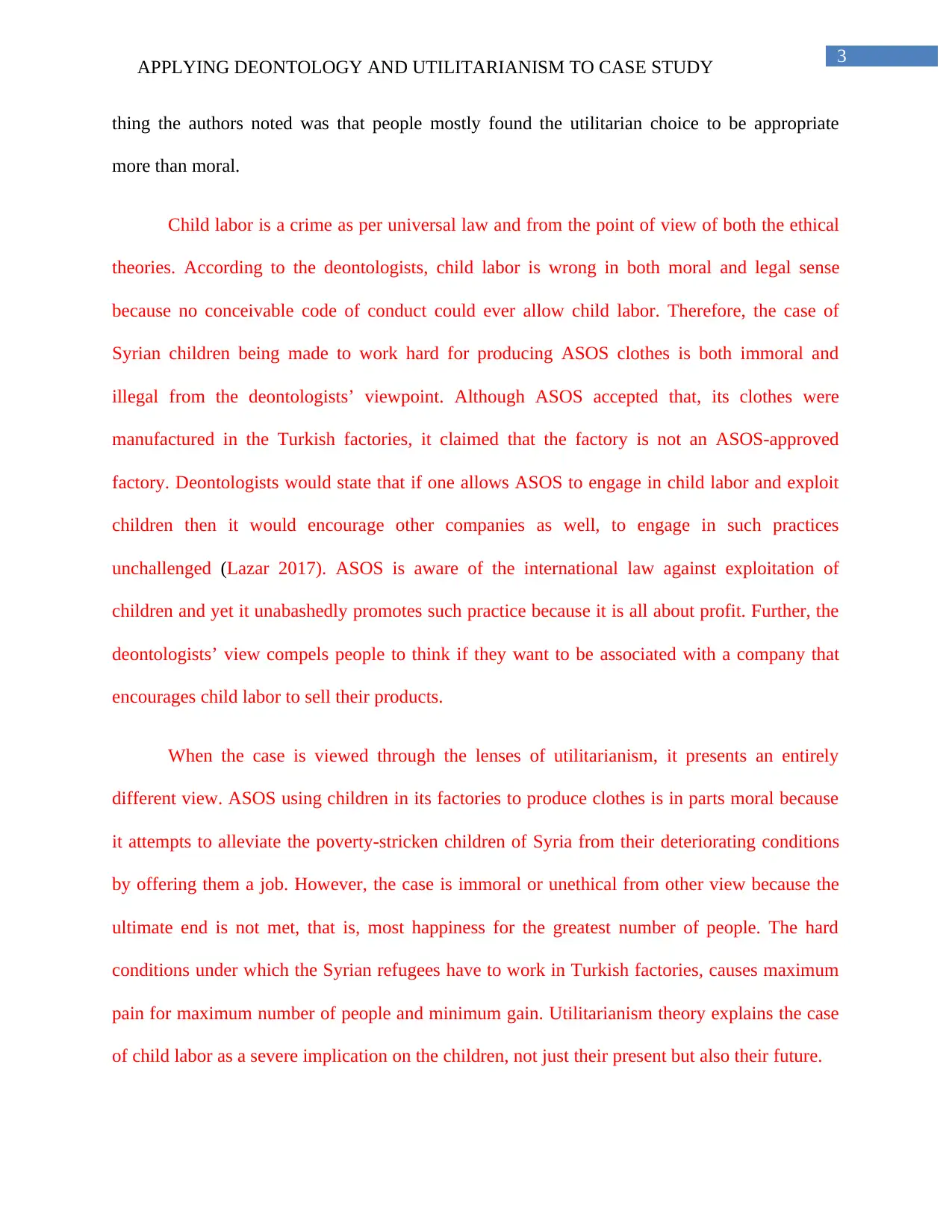
3
APPLYING DEONTOLOGY AND UTILITARIANISM TO CASE STUDY
thing the authors noted was that people mostly found the utilitarian choice to be appropriate
more than moral.
Child labor is a crime as per universal law and from the point of view of both the ethical
theories. According to the deontologists, child labor is wrong in both moral and legal sense
because no conceivable code of conduct could ever allow child labor. Therefore, the case of
Syrian children being made to work hard for producing ASOS clothes is both immoral and
illegal from the deontologists’ viewpoint. Although ASOS accepted that, its clothes were
manufactured in the Turkish factories, it claimed that the factory is not an ASOS-approved
factory. Deontologists would state that if one allows ASOS to engage in child labor and exploit
children then it would encourage other companies as well, to engage in such practices
unchallenged (Lazar 2017). ASOS is aware of the international law against exploitation of
children and yet it unabashedly promotes such practice because it is all about profit. Further, the
deontologists’ view compels people to think if they want to be associated with a company that
encourages child labor to sell their products.
When the case is viewed through the lenses of utilitarianism, it presents an entirely
different view. ASOS using children in its factories to produce clothes is in parts moral because
it attempts to alleviate the poverty-stricken children of Syria from their deteriorating conditions
by offering them a job. However, the case is immoral or unethical from other view because the
ultimate end is not met, that is, most happiness for the greatest number of people. The hard
conditions under which the Syrian refugees have to work in Turkish factories, causes maximum
pain for maximum number of people and minimum gain. Utilitarianism theory explains the case
of child labor as a severe implication on the children, not just their present but also their future.
APPLYING DEONTOLOGY AND UTILITARIANISM TO CASE STUDY
thing the authors noted was that people mostly found the utilitarian choice to be appropriate
more than moral.
Child labor is a crime as per universal law and from the point of view of both the ethical
theories. According to the deontologists, child labor is wrong in both moral and legal sense
because no conceivable code of conduct could ever allow child labor. Therefore, the case of
Syrian children being made to work hard for producing ASOS clothes is both immoral and
illegal from the deontologists’ viewpoint. Although ASOS accepted that, its clothes were
manufactured in the Turkish factories, it claimed that the factory is not an ASOS-approved
factory. Deontologists would state that if one allows ASOS to engage in child labor and exploit
children then it would encourage other companies as well, to engage in such practices
unchallenged (Lazar 2017). ASOS is aware of the international law against exploitation of
children and yet it unabashedly promotes such practice because it is all about profit. Further, the
deontologists’ view compels people to think if they want to be associated with a company that
encourages child labor to sell their products.
When the case is viewed through the lenses of utilitarianism, it presents an entirely
different view. ASOS using children in its factories to produce clothes is in parts moral because
it attempts to alleviate the poverty-stricken children of Syria from their deteriorating conditions
by offering them a job. However, the case is immoral or unethical from other view because the
ultimate end is not met, that is, most happiness for the greatest number of people. The hard
conditions under which the Syrian refugees have to work in Turkish factories, causes maximum
pain for maximum number of people and minimum gain. Utilitarianism theory explains the case
of child labor as a severe implication on the children, not just their present but also their future.
Secure Best Marks with AI Grader
Need help grading? Try our AI Grader for instant feedback on your assignments.
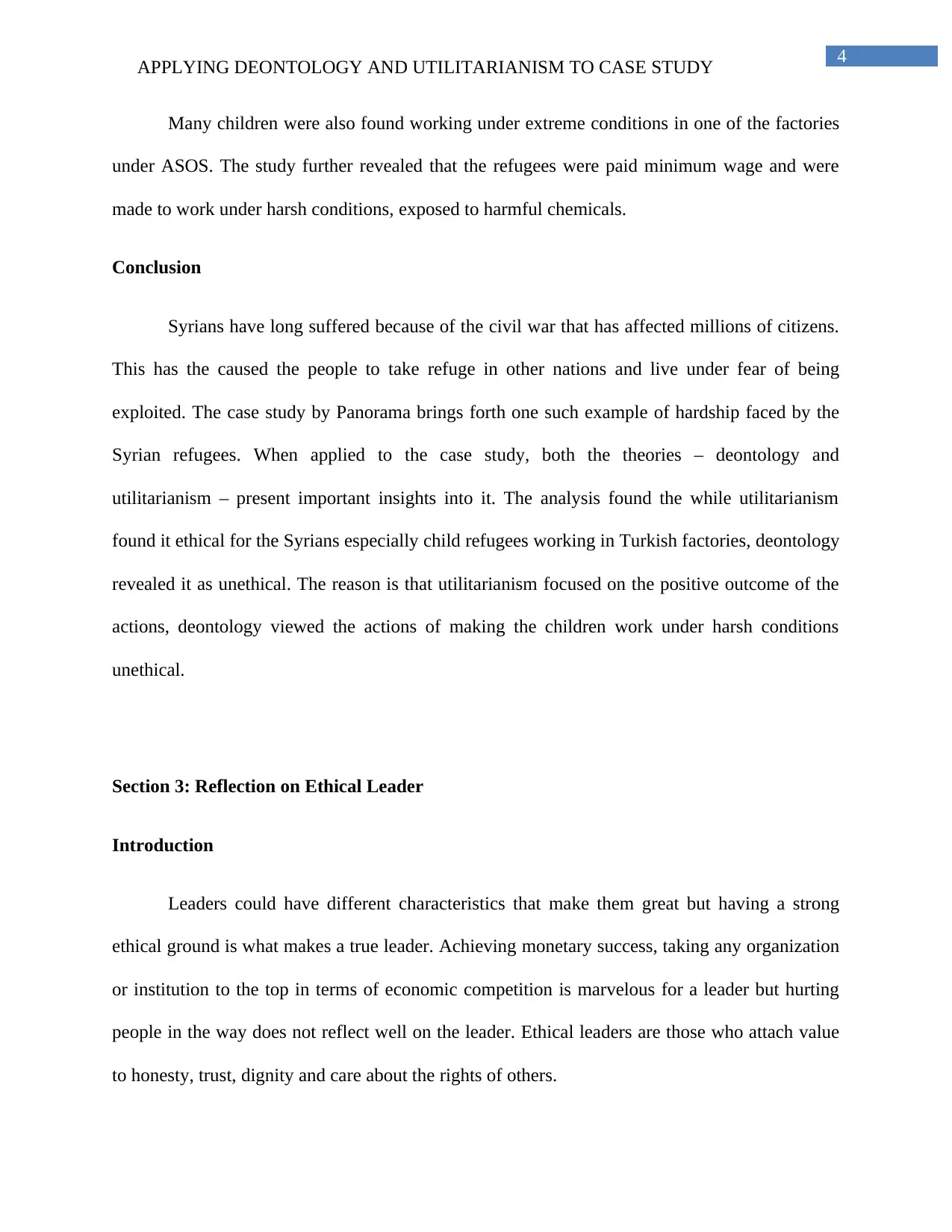
4
APPLYING DEONTOLOGY AND UTILITARIANISM TO CASE STUDY
Many children were also found working under extreme conditions in one of the factories
under ASOS. The study further revealed that the refugees were paid minimum wage and were
made to work under harsh conditions, exposed to harmful chemicals.
Conclusion
Syrians have long suffered because of the civil war that has affected millions of citizens.
This has the caused the people to take refuge in other nations and live under fear of being
exploited. The case study by Panorama brings forth one such example of hardship faced by the
Syrian refugees. When applied to the case study, both the theories – deontology and
utilitarianism – present important insights into it. The analysis found the while utilitarianism
found it ethical for the Syrians especially child refugees working in Turkish factories, deontology
revealed it as unethical. The reason is that utilitarianism focused on the positive outcome of the
actions, deontology viewed the actions of making the children work under harsh conditions
unethical.
Section 3: Reflection on Ethical Leader
Introduction
Leaders could have different characteristics that make them great but having a strong
ethical ground is what makes a true leader. Achieving monetary success, taking any organization
or institution to the top in terms of economic competition is marvelous for a leader but hurting
people in the way does not reflect well on the leader. Ethical leaders are those who attach value
to honesty, trust, dignity and care about the rights of others.
APPLYING DEONTOLOGY AND UTILITARIANISM TO CASE STUDY
Many children were also found working under extreme conditions in one of the factories
under ASOS. The study further revealed that the refugees were paid minimum wage and were
made to work under harsh conditions, exposed to harmful chemicals.
Conclusion
Syrians have long suffered because of the civil war that has affected millions of citizens.
This has the caused the people to take refuge in other nations and live under fear of being
exploited. The case study by Panorama brings forth one such example of hardship faced by the
Syrian refugees. When applied to the case study, both the theories – deontology and
utilitarianism – present important insights into it. The analysis found the while utilitarianism
found it ethical for the Syrians especially child refugees working in Turkish factories, deontology
revealed it as unethical. The reason is that utilitarianism focused on the positive outcome of the
actions, deontology viewed the actions of making the children work under harsh conditions
unethical.
Section 3: Reflection on Ethical Leader
Introduction
Leaders could have different characteristics that make them great but having a strong
ethical ground is what makes a true leader. Achieving monetary success, taking any organization
or institution to the top in terms of economic competition is marvelous for a leader but hurting
people in the way does not reflect well on the leader. Ethical leaders are those who attach value
to honesty, trust, dignity and care about the rights of others.
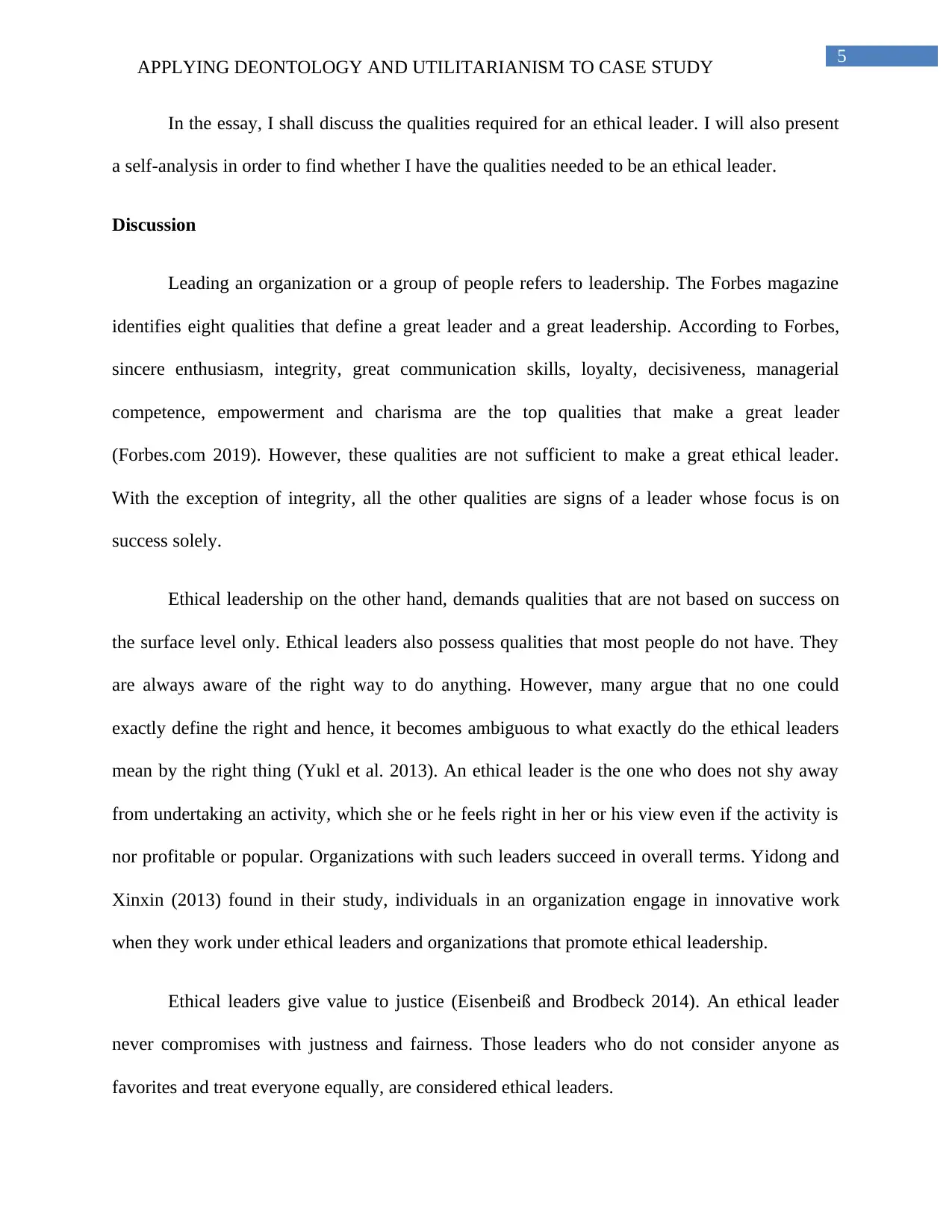
5
APPLYING DEONTOLOGY AND UTILITARIANISM TO CASE STUDY
In the essay, I shall discuss the qualities required for an ethical leader. I will also present
a self-analysis in order to find whether I have the qualities needed to be an ethical leader.
Discussion
Leading an organization or a group of people refers to leadership. The Forbes magazine
identifies eight qualities that define a great leader and a great leadership. According to Forbes,
sincere enthusiasm, integrity, great communication skills, loyalty, decisiveness, managerial
competence, empowerment and charisma are the top qualities that make a great leader
(Forbes.com 2019). However, these qualities are not sufficient to make a great ethical leader.
With the exception of integrity, all the other qualities are signs of a leader whose focus is on
success solely.
Ethical leadership on the other hand, demands qualities that are not based on success on
the surface level only. Ethical leaders also possess qualities that most people do not have. They
are always aware of the right way to do anything. However, many argue that no one could
exactly define the right and hence, it becomes ambiguous to what exactly do the ethical leaders
mean by the right thing (Yukl et al. 2013). An ethical leader is the one who does not shy away
from undertaking an activity, which she or he feels right in her or his view even if the activity is
nor profitable or popular. Organizations with such leaders succeed in overall terms. Yidong and
Xinxin (2013) found in their study, individuals in an organization engage in innovative work
when they work under ethical leaders and organizations that promote ethical leadership.
Ethical leaders give value to justice (Eisenbeiß and Brodbeck 2014). An ethical leader
never compromises with justness and fairness. Those leaders who do not consider anyone as
favorites and treat everyone equally, are considered ethical leaders.
APPLYING DEONTOLOGY AND UTILITARIANISM TO CASE STUDY
In the essay, I shall discuss the qualities required for an ethical leader. I will also present
a self-analysis in order to find whether I have the qualities needed to be an ethical leader.
Discussion
Leading an organization or a group of people refers to leadership. The Forbes magazine
identifies eight qualities that define a great leader and a great leadership. According to Forbes,
sincere enthusiasm, integrity, great communication skills, loyalty, decisiveness, managerial
competence, empowerment and charisma are the top qualities that make a great leader
(Forbes.com 2019). However, these qualities are not sufficient to make a great ethical leader.
With the exception of integrity, all the other qualities are signs of a leader whose focus is on
success solely.
Ethical leadership on the other hand, demands qualities that are not based on success on
the surface level only. Ethical leaders also possess qualities that most people do not have. They
are always aware of the right way to do anything. However, many argue that no one could
exactly define the right and hence, it becomes ambiguous to what exactly do the ethical leaders
mean by the right thing (Yukl et al. 2013). An ethical leader is the one who does not shy away
from undertaking an activity, which she or he feels right in her or his view even if the activity is
nor profitable or popular. Organizations with such leaders succeed in overall terms. Yidong and
Xinxin (2013) found in their study, individuals in an organization engage in innovative work
when they work under ethical leaders and organizations that promote ethical leadership.
Ethical leaders give value to justice (Eisenbeiß and Brodbeck 2014). An ethical leader
never compromises with justness and fairness. Those leaders who do not consider anyone as
favorites and treat everyone equally, are considered ethical leaders.
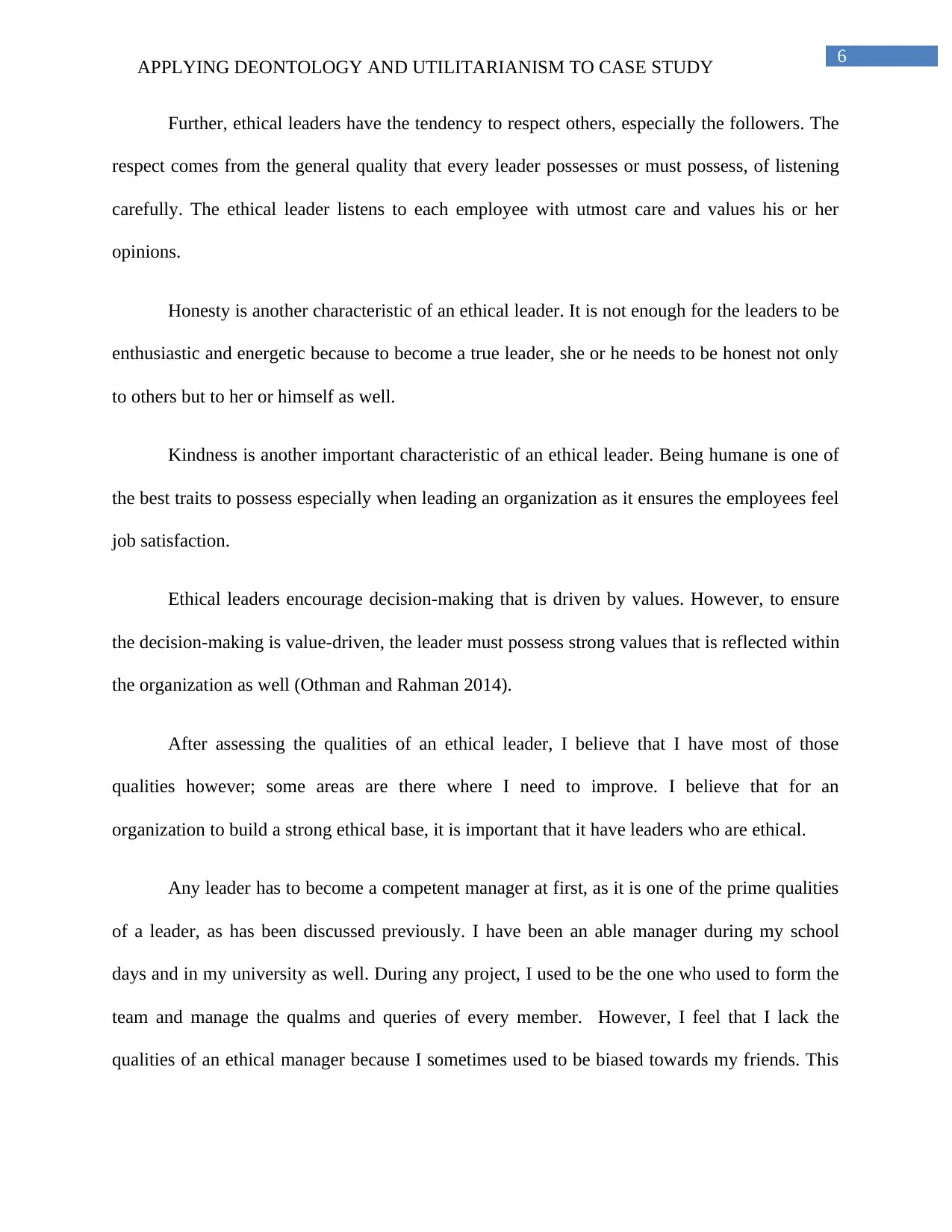
6
APPLYING DEONTOLOGY AND UTILITARIANISM TO CASE STUDY
Further, ethical leaders have the tendency to respect others, especially the followers. The
respect comes from the general quality that every leader possesses or must possess, of listening
carefully. The ethical leader listens to each employee with utmost care and values his or her
opinions.
Honesty is another characteristic of an ethical leader. It is not enough for the leaders to be
enthusiastic and energetic because to become a true leader, she or he needs to be honest not only
to others but to her or himself as well.
Kindness is another important characteristic of an ethical leader. Being humane is one of
the best traits to possess especially when leading an organization as it ensures the employees feel
job satisfaction.
Ethical leaders encourage decision-making that is driven by values. However, to ensure
the decision-making is value-driven, the leader must possess strong values that is reflected within
the organization as well (Othman and Rahman 2014).
After assessing the qualities of an ethical leader, I believe that I have most of those
qualities however; some areas are there where I need to improve. I believe that for an
organization to build a strong ethical base, it is important that it have leaders who are ethical.
Any leader has to become a competent manager at first, as it is one of the prime qualities
of a leader, as has been discussed previously. I have been an able manager during my school
days and in my university as well. During any project, I used to be the one who used to form the
team and manage the qualms and queries of every member. However, I feel that I lack the
qualities of an ethical manager because I sometimes used to be biased towards my friends. This
APPLYING DEONTOLOGY AND UTILITARIANISM TO CASE STUDY
Further, ethical leaders have the tendency to respect others, especially the followers. The
respect comes from the general quality that every leader possesses or must possess, of listening
carefully. The ethical leader listens to each employee with utmost care and values his or her
opinions.
Honesty is another characteristic of an ethical leader. It is not enough for the leaders to be
enthusiastic and energetic because to become a true leader, she or he needs to be honest not only
to others but to her or himself as well.
Kindness is another important characteristic of an ethical leader. Being humane is one of
the best traits to possess especially when leading an organization as it ensures the employees feel
job satisfaction.
Ethical leaders encourage decision-making that is driven by values. However, to ensure
the decision-making is value-driven, the leader must possess strong values that is reflected within
the organization as well (Othman and Rahman 2014).
After assessing the qualities of an ethical leader, I believe that I have most of those
qualities however; some areas are there where I need to improve. I believe that for an
organization to build a strong ethical base, it is important that it have leaders who are ethical.
Any leader has to become a competent manager at first, as it is one of the prime qualities
of a leader, as has been discussed previously. I have been an able manager during my school
days and in my university as well. During any project, I used to be the one who used to form the
team and manage the qualms and queries of every member. However, I feel that I lack the
qualities of an ethical manager because I sometimes used to be biased towards my friends. This
Paraphrase This Document
Need a fresh take? Get an instant paraphrase of this document with our AI Paraphraser
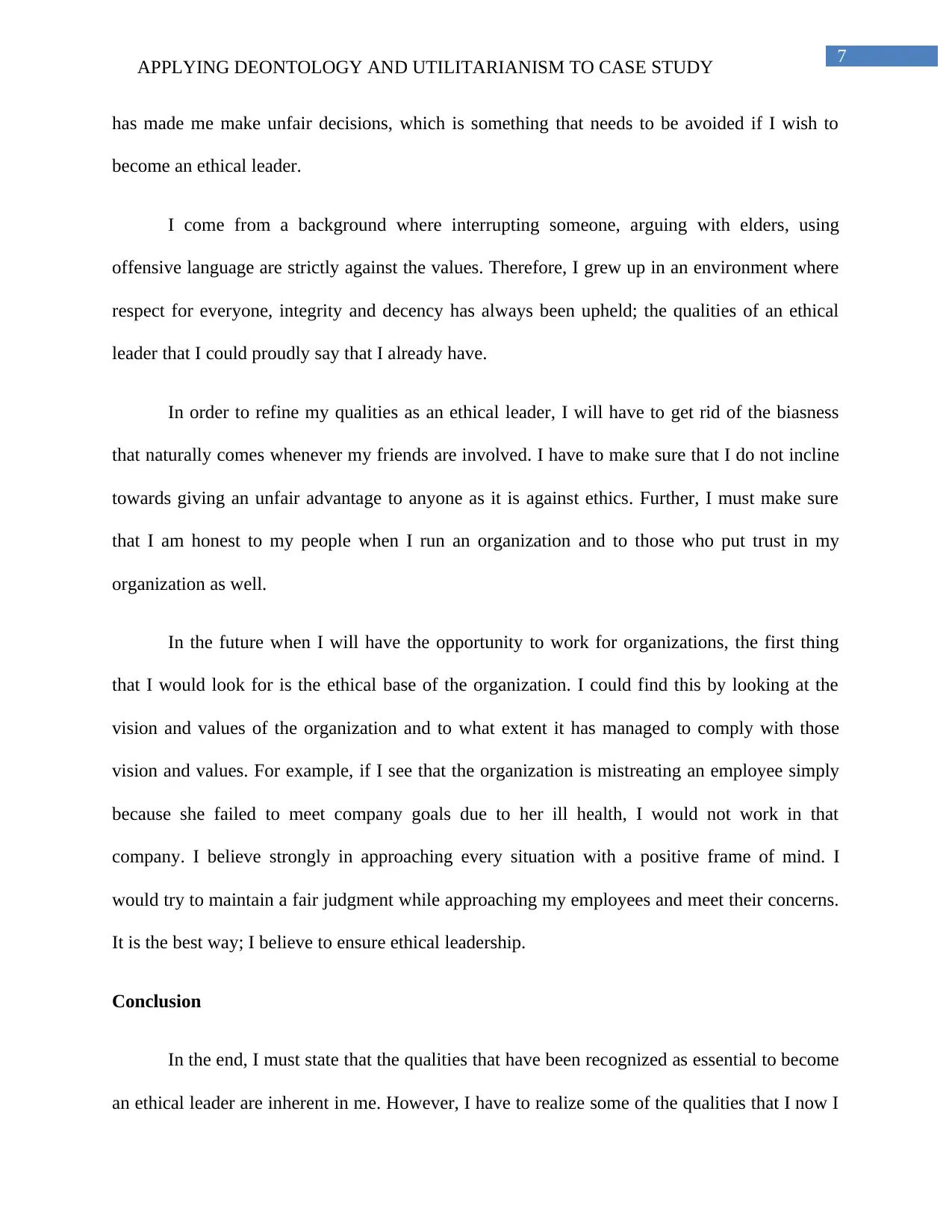
7
APPLYING DEONTOLOGY AND UTILITARIANISM TO CASE STUDY
has made me make unfair decisions, which is something that needs to be avoided if I wish to
become an ethical leader.
I come from a background where interrupting someone, arguing with elders, using
offensive language are strictly against the values. Therefore, I grew up in an environment where
respect for everyone, integrity and decency has always been upheld; the qualities of an ethical
leader that I could proudly say that I already have.
In order to refine my qualities as an ethical leader, I will have to get rid of the biasness
that naturally comes whenever my friends are involved. I have to make sure that I do not incline
towards giving an unfair advantage to anyone as it is against ethics. Further, I must make sure
that I am honest to my people when I run an organization and to those who put trust in my
organization as well.
In the future when I will have the opportunity to work for organizations, the first thing
that I would look for is the ethical base of the organization. I could find this by looking at the
vision and values of the organization and to what extent it has managed to comply with those
vision and values. For example, if I see that the organization is mistreating an employee simply
because she failed to meet company goals due to her ill health, I would not work in that
company. I believe strongly in approaching every situation with a positive frame of mind. I
would try to maintain a fair judgment while approaching my employees and meet their concerns.
It is the best way; I believe to ensure ethical leadership.
Conclusion
In the end, I must state that the qualities that have been recognized as essential to become
an ethical leader are inherent in me. However, I have to realize some of the qualities that I now I
APPLYING DEONTOLOGY AND UTILITARIANISM TO CASE STUDY
has made me make unfair decisions, which is something that needs to be avoided if I wish to
become an ethical leader.
I come from a background where interrupting someone, arguing with elders, using
offensive language are strictly against the values. Therefore, I grew up in an environment where
respect for everyone, integrity and decency has always been upheld; the qualities of an ethical
leader that I could proudly say that I already have.
In order to refine my qualities as an ethical leader, I will have to get rid of the biasness
that naturally comes whenever my friends are involved. I have to make sure that I do not incline
towards giving an unfair advantage to anyone as it is against ethics. Further, I must make sure
that I am honest to my people when I run an organization and to those who put trust in my
organization as well.
In the future when I will have the opportunity to work for organizations, the first thing
that I would look for is the ethical base of the organization. I could find this by looking at the
vision and values of the organization and to what extent it has managed to comply with those
vision and values. For example, if I see that the organization is mistreating an employee simply
because she failed to meet company goals due to her ill health, I would not work in that
company. I believe strongly in approaching every situation with a positive frame of mind. I
would try to maintain a fair judgment while approaching my employees and meet their concerns.
It is the best way; I believe to ensure ethical leadership.
Conclusion
In the end, I must state that the qualities that have been recognized as essential to become
an ethical leader are inherent in me. However, I have to realize some of the qualities that I now I
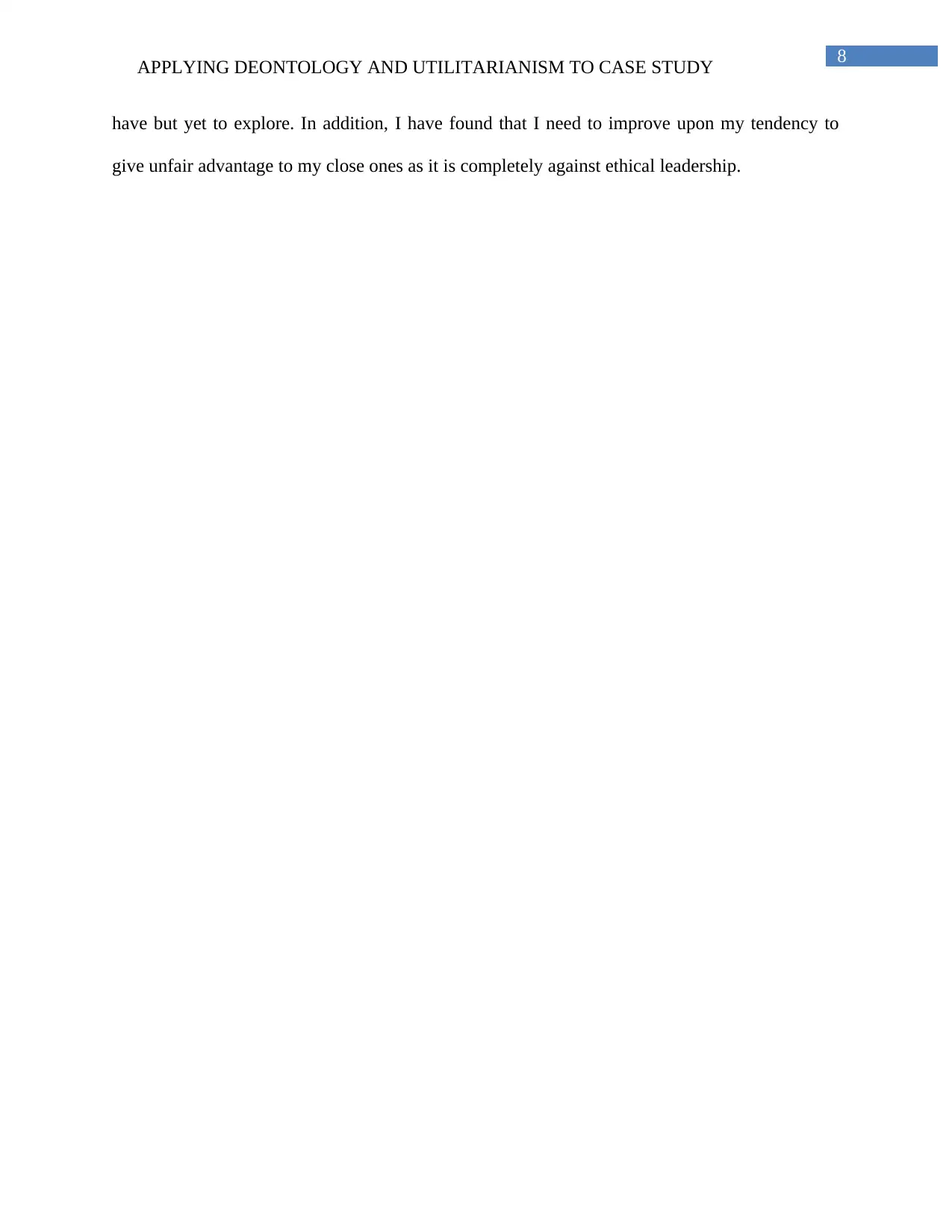
8
APPLYING DEONTOLOGY AND UTILITARIANISM TO CASE STUDY
have but yet to explore. In addition, I have found that I need to improve upon my tendency to
give unfair advantage to my close ones as it is completely against ethical leadership.
APPLYING DEONTOLOGY AND UTILITARIANISM TO CASE STUDY
have but yet to explore. In addition, I have found that I need to improve upon my tendency to
give unfair advantage to my close ones as it is completely against ethical leadership.
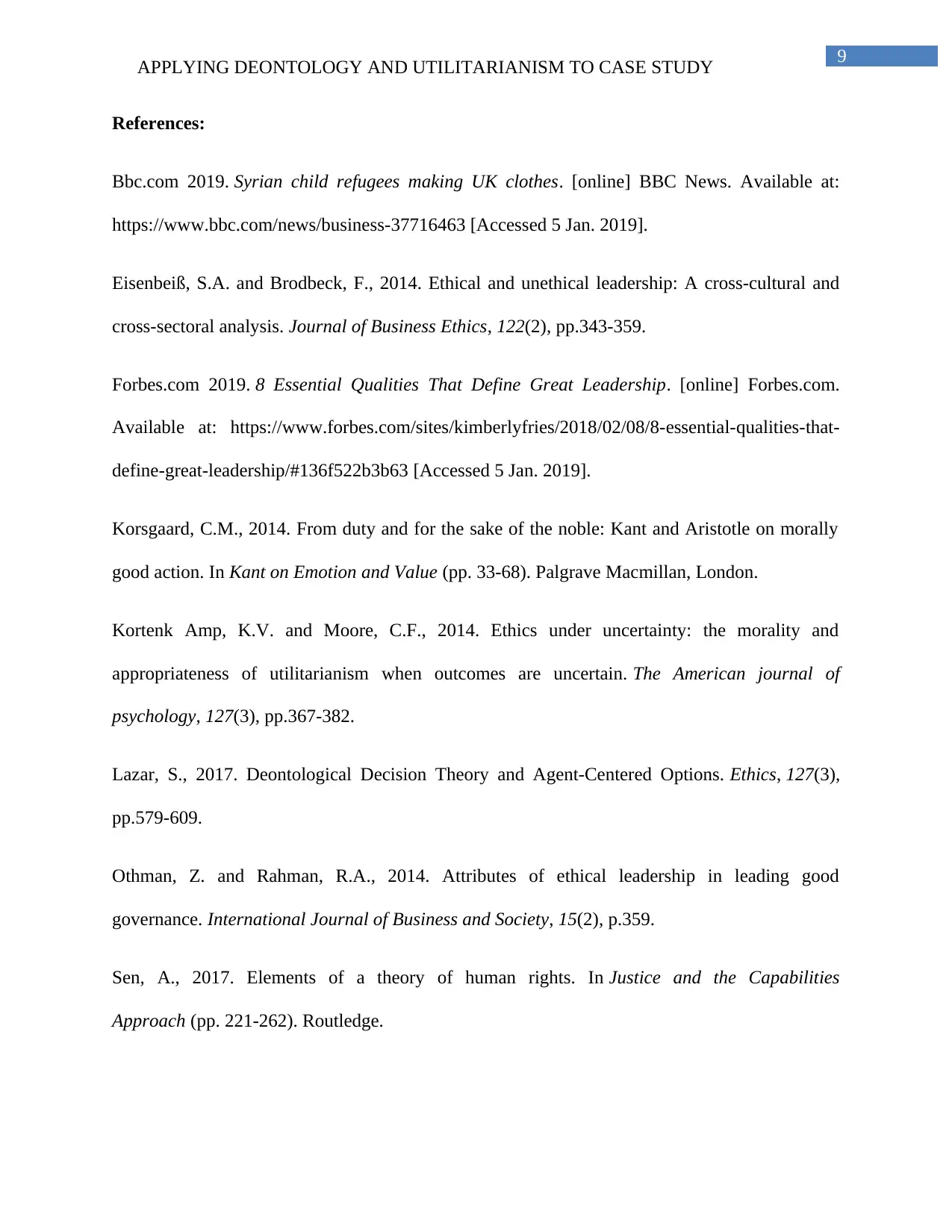
9
APPLYING DEONTOLOGY AND UTILITARIANISM TO CASE STUDY
References:
Bbc.com 2019. Syrian child refugees making UK clothes. [online] BBC News. Available at:
https://www.bbc.com/news/business-37716463 [Accessed 5 Jan. 2019].
Eisenbeiß, S.A. and Brodbeck, F., 2014. Ethical and unethical leadership: A cross-cultural and
cross-sectoral analysis. Journal of Business Ethics, 122(2), pp.343-359.
Forbes.com 2019. 8 Essential Qualities That Define Great Leadership. [online] Forbes.com.
Available at: https://www.forbes.com/sites/kimberlyfries/2018/02/08/8-essential-qualities-that-
define-great-leadership/#136f522b3b63 [Accessed 5 Jan. 2019].
Korsgaard, C.M., 2014. From duty and for the sake of the noble: Kant and Aristotle on morally
good action. In Kant on Emotion and Value (pp. 33-68). Palgrave Macmillan, London.
Kortenk Amp, K.V. and Moore, C.F., 2014. Ethics under uncertainty: the morality and
appropriateness of utilitarianism when outcomes are uncertain. The American journal of
psychology, 127(3), pp.367-382.
Lazar, S., 2017. Deontological Decision Theory and Agent-Centered Options. Ethics, 127(3),
pp.579-609.
Othman, Z. and Rahman, R.A., 2014. Attributes of ethical leadership in leading good
governance. International Journal of Business and Society, 15(2), p.359.
Sen, A., 2017. Elements of a theory of human rights. In Justice and the Capabilities
Approach (pp. 221-262). Routledge.
APPLYING DEONTOLOGY AND UTILITARIANISM TO CASE STUDY
References:
Bbc.com 2019. Syrian child refugees making UK clothes. [online] BBC News. Available at:
https://www.bbc.com/news/business-37716463 [Accessed 5 Jan. 2019].
Eisenbeiß, S.A. and Brodbeck, F., 2014. Ethical and unethical leadership: A cross-cultural and
cross-sectoral analysis. Journal of Business Ethics, 122(2), pp.343-359.
Forbes.com 2019. 8 Essential Qualities That Define Great Leadership. [online] Forbes.com.
Available at: https://www.forbes.com/sites/kimberlyfries/2018/02/08/8-essential-qualities-that-
define-great-leadership/#136f522b3b63 [Accessed 5 Jan. 2019].
Korsgaard, C.M., 2014. From duty and for the sake of the noble: Kant and Aristotle on morally
good action. In Kant on Emotion and Value (pp. 33-68). Palgrave Macmillan, London.
Kortenk Amp, K.V. and Moore, C.F., 2014. Ethics under uncertainty: the morality and
appropriateness of utilitarianism when outcomes are uncertain. The American journal of
psychology, 127(3), pp.367-382.
Lazar, S., 2017. Deontological Decision Theory and Agent-Centered Options. Ethics, 127(3),
pp.579-609.
Othman, Z. and Rahman, R.A., 2014. Attributes of ethical leadership in leading good
governance. International Journal of Business and Society, 15(2), p.359.
Sen, A., 2017. Elements of a theory of human rights. In Justice and the Capabilities
Approach (pp. 221-262). Routledge.
Secure Best Marks with AI Grader
Need help grading? Try our AI Grader for instant feedback on your assignments.
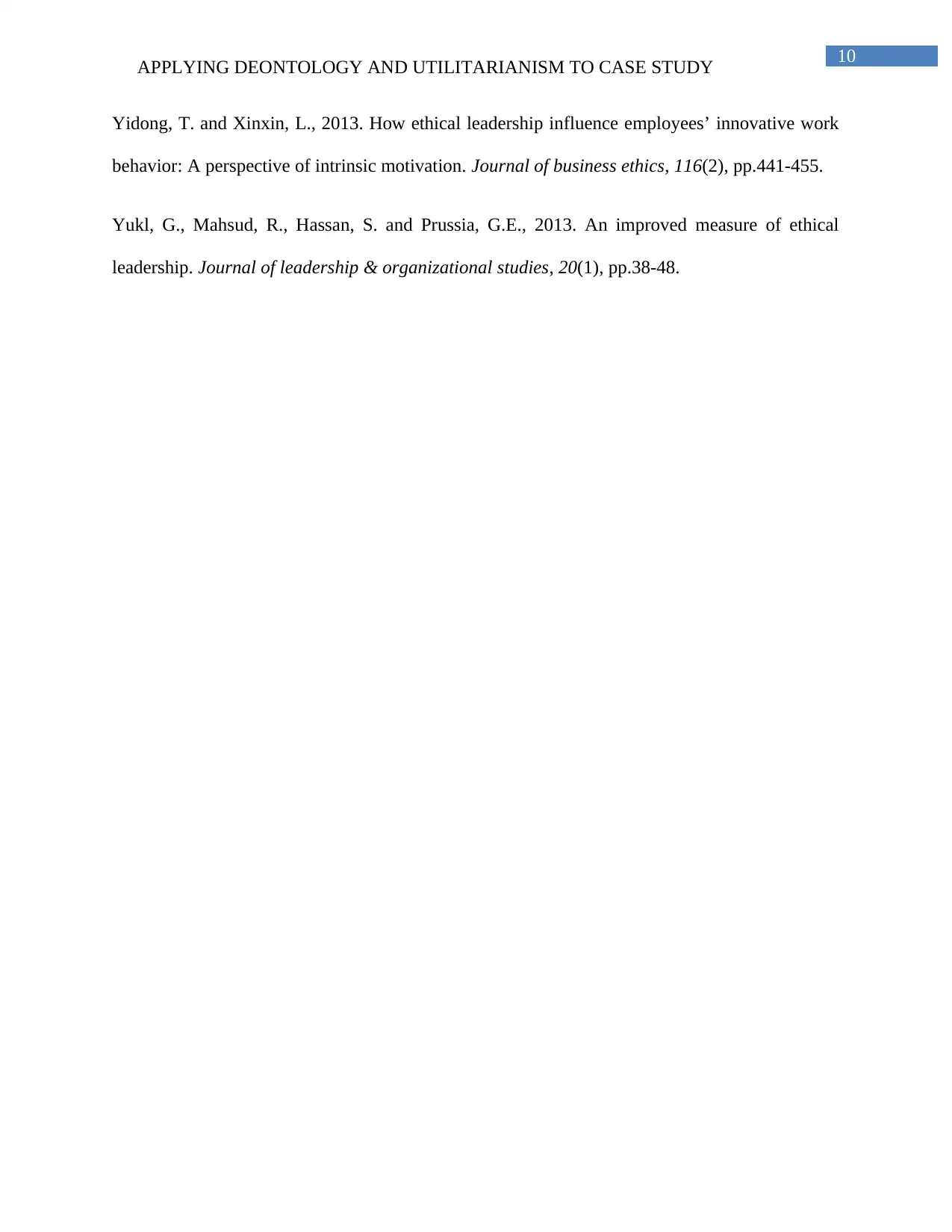
10
APPLYING DEONTOLOGY AND UTILITARIANISM TO CASE STUDY
Yidong, T. and Xinxin, L., 2013. How ethical leadership influence employees’ innovative work
behavior: A perspective of intrinsic motivation. Journal of business ethics, 116(2), pp.441-455.
Yukl, G., Mahsud, R., Hassan, S. and Prussia, G.E., 2013. An improved measure of ethical
leadership. Journal of leadership & organizational studies, 20(1), pp.38-48.
APPLYING DEONTOLOGY AND UTILITARIANISM TO CASE STUDY
Yidong, T. and Xinxin, L., 2013. How ethical leadership influence employees’ innovative work
behavior: A perspective of intrinsic motivation. Journal of business ethics, 116(2), pp.441-455.
Yukl, G., Mahsud, R., Hassan, S. and Prussia, G.E., 2013. An improved measure of ethical
leadership. Journal of leadership & organizational studies, 20(1), pp.38-48.
1 out of 11
Related Documents
Your All-in-One AI-Powered Toolkit for Academic Success.
+13062052269
info@desklib.com
Available 24*7 on WhatsApp / Email
![[object Object]](/_next/static/media/star-bottom.7253800d.svg)
Unlock your academic potential
© 2024 | Zucol Services PVT LTD | All rights reserved.





